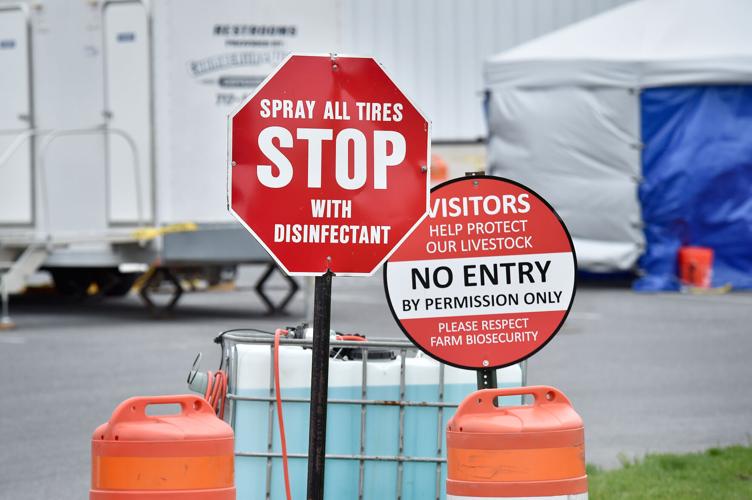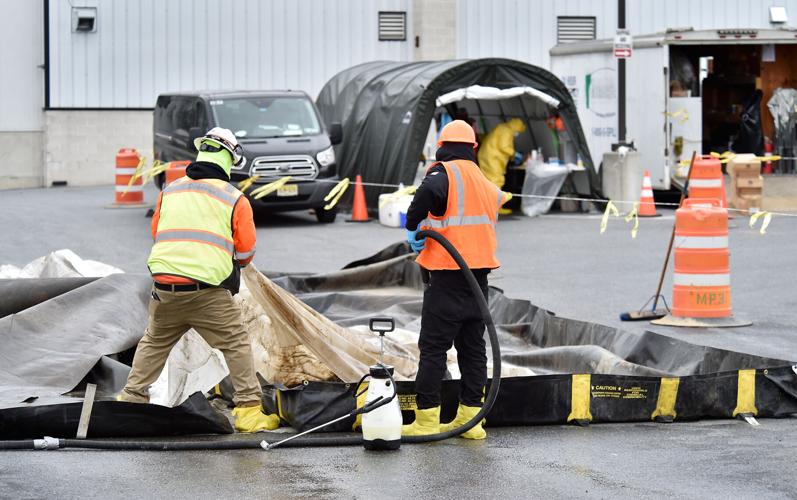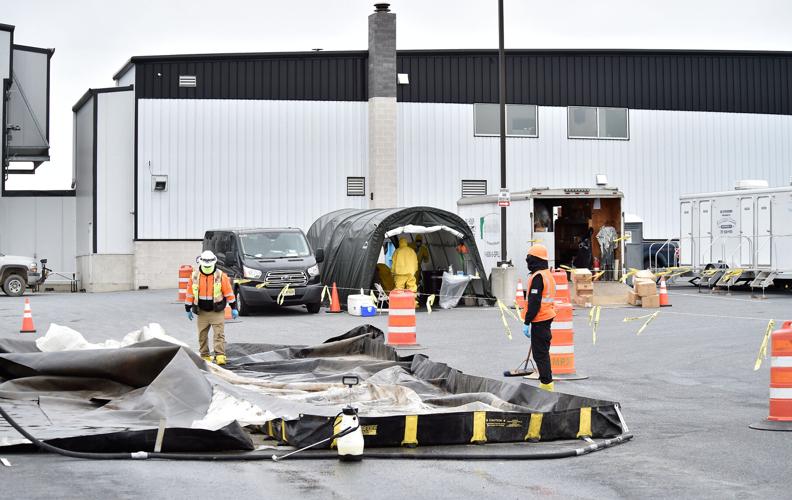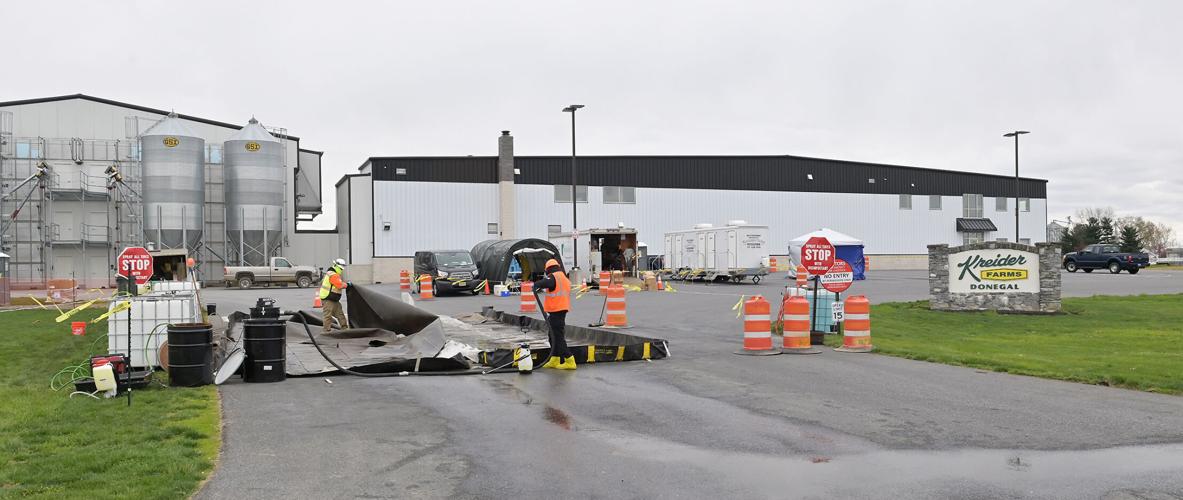For the first time in almost 40 years, a highly contagious strain of avian flu was detected on a Lancaster County farm, setting in motion a massive response to eliminate more than a million birds and to establish a quarantine zone in a large swath of the county.
The disease was found at an East Donegal Township facility owned and operated by Kreider Farms, a family owned dairy, egg and poultry enterprise that farms more than 3,000 acres in Lancaster, Lebanon and Dauphin counties and employs 450 people.
“Kreider Farms, along with state and USDA officials, has been working round the clock to reduce the risk of further spread of the avian influenza,” said Tom Beachler, the company’s vice president of operations, in a statement. “The loss of birds at this site represents 15% of our egg layers. Fortunately, we are still able to fill customer egg orders from our other remaining locations which have all tested negative for the virus.”
State officials said another 160-plus poultry operations surrounding the farm on Colebrook Road will be subjected to increased scrutiny and testing requirements under a 10-kilometer-diamter quarantine zone.
Those precautions are part of an effort to stop the spread of highly pathogenic avian influenza, which state Agriculture Secretary Russell Redding described as a threat to Pennsylvania’s $7.1 billion poultry industry, a large part of which is located in the county.
“The heart of the poultry industry in Pennsylvania is in Lancaster County,” Redding said, revealing what’s at stake.
There is no imminent human health threat, experts have said.
Protecting county’s farms
Farmers and regulators have been on high alert for months after the current strain of the avian virus began spreading in the United States in December.
The Lancaster County outbreak was announced Saturday, but it wasn’t until Monday afternoon that Beachler issued his statement revealing the Kreider property was the site. Even at a 1 p.m. press conference in Harrisburg, state agriculture officials declined to identify the location, citing worries about drawing unwanted attention to the site.
“Additional traffic to the area increases the risk of spreading the infection to other poultry farms,” said Shannon Powers, a department spokesperson.
Guarding against that spread is important in an area like Lancaster County, where there are more than 1,600 individual poultry farms that house more than 20 million birds (egg layers and meat birds), according to state and national estimates.
Lancaster County is the fourth most productive county in the United States when it comes to poultry and eggs, according to the Lancaster County Agriculture Council.
Those birds are now under threat from the current strain of avian flu, which is categorized as highly pathogenic — meaning the virus is likely to cause severe illness and death.
“It is alarming considering the amount of birds we have in the county,” said Gregory Martin, a Lancaster County-based poultry expert with the Penn State Extension.
It’s unclear how the Kreider chickens became infected, whether from wild birds or farm-to-farm transmission, officials said, adding that testing is ongoing to trace the origin.
Regardless, though, the main goal now is to make sure other Pennsylvania farms don’t share the same fate, Redding said.
“Protecting Pennsylvania’s $7.1 billion poultry industry is a year-round top priority. … Anyone visiting a farm should be aware that your vehicles and shoes may carry the virus from other places you have walked. Clean them thoroughly and stay away from poultry barns unless you have to be there. Please be vigilant and do your part to protect our farms.” Redding said in a statement.
The 10-kilometer quarantine zone is expected to help with that vigilance, state officials said, explaining that poultry and egg producers in that area must submit to increased testing of animals (representative samples, not all birds) and scrutiny before moving products off of their farms.
Martin said farmers are expected to do their part to prevent the spread and to protect their revenue, as well as that of their neighbors.
“There isn’t a guard at the gate. You’re basically on your honor system,” Martin said, adding that penalties exist for those skirting bolstered regulations within the quarantine zone.
On Monday, signs of increased vigilance and preventive steps could be seen at several farms in East Donegal, with signs warning visitors to wash boots and vehicle tires on entering and leaving properties.
Depopulation is first step
Avian influenza is most commonly spread when healthy birds come in contact with bodily fluids from an infected bird, state officials said. However, it can also be spread on contaminated clothes or equipment worn and used by farmers and farm visitors.
Once infected, avian species — including chickens, ducks, geese, quail, pheasants, guinea fowl and turkeys — can show symptoms like reduced coordination, diarrhea, nasal discharge, decreased or abnormal egg laying, lack of energy, lack of appetite and even sudden death, experts said.
Most often, the flu proves fatal in birds, Martin said, explaining that the illness “basically strangles them to death slowly.”
It would be cruel to allow poultry to suffer with the illness, Martin said, so entire flocks are typically depopulated if even a single bird tests positive.
“It is far less humane to let them live with this,” he said.
According to Martin, the illness spread quickly through the Kreider flock, requiring that 1.4 million birds be depopulated — a term used to describe the quick, “humane” killing of birds in an attempt to stop the flu’s spread.
Martin said there are numerous approved depopulation methods, but neither he nor state officials would say exactly how chickens were euthanized on the East Donegal Township farm.
Following depopulation, the birds must be properly disposed of, and in the case of the Kreider flock, the carcasses will be safely composted, according to Alex Hamberg, assistant director of the Bureau of Animal Health and Diagnostic Services. The composting, he said, will be regulated and conducted in a way designed to prevent the illness from spreading or coming into contact with other wild birds, including scavenger species.
According to the Pennsylvania Emergency Management Agency, the depopulation work at Kreider Farms began on April 14 and was expected to be complete by the end of April 17, Easter Sunday.
Avian flu is detected at Kreider Farms in Lancaster County [photos]
Learning from past outbreaks
Wild birds can contract, carry and spread this strain of highly pathogenic avian influenza. In fact, it’s believed that the current U.S. outbreak is due to infected waterfowl that migrated to the area from Europe, experts said. At least one infected wild bird, a deceased bald eagle, was found this year in Pennsylvania, in neighboring Chester County.
This is the first time that highly pathogenic avian flu has impacted a commercial poultry flock in Pennsylvania since 1983-84, when an outbreak resulted in the deaths of more than 17 million chickens, turkeys and guinea fowl. The outbreak was worst in Lancaster County. As a result, poultry producers saw losses of $60 million, Powers said, adding that the cost to consumers was even greater at $350 million, stemming from related increases in the price of poultry products.
In 2014-15, an outbreak in 21 states, excluding Pennsylvania, resulted in the loss of about 7.4 million turkeys, 43 million chickens and a number of other bird species. They either died from the illness or were depopulated, according to USDA officials.
“This outbreak was the largest HPAI outbreak ever recorded in the United States and arguably the most significant animal health event in U.S. history,” officials said in a post-outbreak report.
Since this December, the current outbreak has affected more than 27 million birds in nearly 30 states, according to U.S. Centers For Disease Control and Prevention.
For local farmers, those losses are costly, not only due to the initial loss of birds but also a period of mandatory inaction that follows as farms are thoroughly cleaned to eradicate all traces of the illness. Regulators must give their approval before regular farming can resume — a process likely to take weeks if not months.
“Think about what happened to restaurants during COVID,” Martin said. “They are shut down, and they will be down for a while.”
Government indemnity programs exist to help cover some of those losses, Redding said at a Monday news conference in Harrisburg.
“We have had $2 million budgeted and set aside since 2016 to respond to avian influenza, in addition to equipment, supplies, laboratories and highly trained experts who have been on high alert and are supporting our poultry farmers,” state officials said in a news release.
Because of that preparedness, Redding said Monday he hopes Pennsylvania losses will be fewer during this outbreak than in 1983-84.
“We are prepared for this moment,” he said, later continuing, “Nobody wants to be in this moment.”
Since the latest outbreak was announced, state lawmakers from Lancaster County — Sen. Ryan Aument and Rep. Mindy Fee, both Republicans — have announced intentions to introduce a bill that would make another $2 million available for the “detection, response and prevention of avian flu.”
In a news release, Aument said: “Pennsylvania must be in a position to act and adapt quickly in order to protect our poultry flocks, farmers, and families, and this additional funding will go a long way to limiting the impact of the avian flu on our farms and food supply.”
Fee added: “Agriculture plays a key role in Pennsylvania’s economy, and certainly in Lancaster County’s economy. As our number one industry, there is a critical need to adequately prepare and address potential threats to agriculture, including outbreaks of bird flu.”
Vigilance and safety
Birds depopulated from the Kreider flock will not be sold for consumption, state officials said.
However, experts from multiple organizations and agencies have said it’s safe for consumers to continue to purchase and ingest poultry and eggs as long as they are cooked properly.
Among them was Chris Herr, executive vice president of PennAg Industries Association, which represents the vast majority of local poultry farms. Still, he called the local outbreak “very troubling.”
“They should also understand that Avian Influenza is not just a disease that impacts commercial poultry,” he said. “Backyard flocks are also susceptible to the virus. If you have pet or backyard birds and they become sick please contact the Pennsylvania Department of Agriculture.”
In rare cases, humans have contracted avian flu, but experts, including at the CDC, have said this outbreak poses a low risk to people.
In general, people should avoid interacting with wild or sick birds, experts have said.
Farmers or backyard hobbyists who believe their poultry may be infected have been asked to report illnesses to the Pennsylvania Bureau of Animal Health and Diagnostic Services at 717-772-2852 (select option 1).
Those who encounter sick or dead wild birds should contact the state Game Commission at 610-926-3136, officials said.












